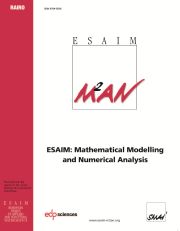Article contents
An equilibrated residual method with a computableerror approximation for a singularly perturbed reaction-diffusion problem on anisotropicfinite element meshes
Published online by Cambridge University Press: 21 June 2006
Abstract
Singularly perturbed reaction-diffusionproblems exhibit in general solutions with anisotropic features,e.g. strong boundary and/or interior layers.This anisotropy is reflected in a discretization by using mesheswith anisotropic elements. The quality of the numerical solutionrests on the robustness of the a posteriori error estimator withrespect to both, the perturbation parameters of the problemand the anisotropy of the mesh. The equilibrated residual method has been shown to provide one of the most reliable error estimates for the reaction-diffusion problem. Its modification suggested byAinsworth and Babuška has been proved to be robust for the case of singular perturbation. In the present work we investigate the modified method on anisotropic meshes. The method in the form of Ainsworth and Babuška is shown here to fail on anisotropic meshes. We suggest a new modification based on the stretching ratios of the mesh elements. The resulting error estimator is equivalent tothe equilibrated residual method in the case of isotropic meshesand is proved to be robust on anisotropic meshes as well. Among others, the equilibrated residual method involves the solution of an infinite dimensional local problem on each element. In practical computations an approximate solution to this local problem was successfully computed. Nevertheless, up to now no rigorous analysis has been done showing the appropriateness of any computable approximation. This demands special attention since an improper approximate solution to the local problem can be fatal for the robustness of the whole method. In the present work we provide one of the desired approximations. We prove that the method is not affected by the approximate solution of the local problem.
Keywords
- Type
- Research Article
- Information
- ESAIM: Mathematical Modelling and Numerical Analysis , Volume 40 , Issue 2 , March 2006 , pp. 239 - 267
- Copyright
- © EDP Sciences, SMAI, 2006
References
- 9
- Cited by


